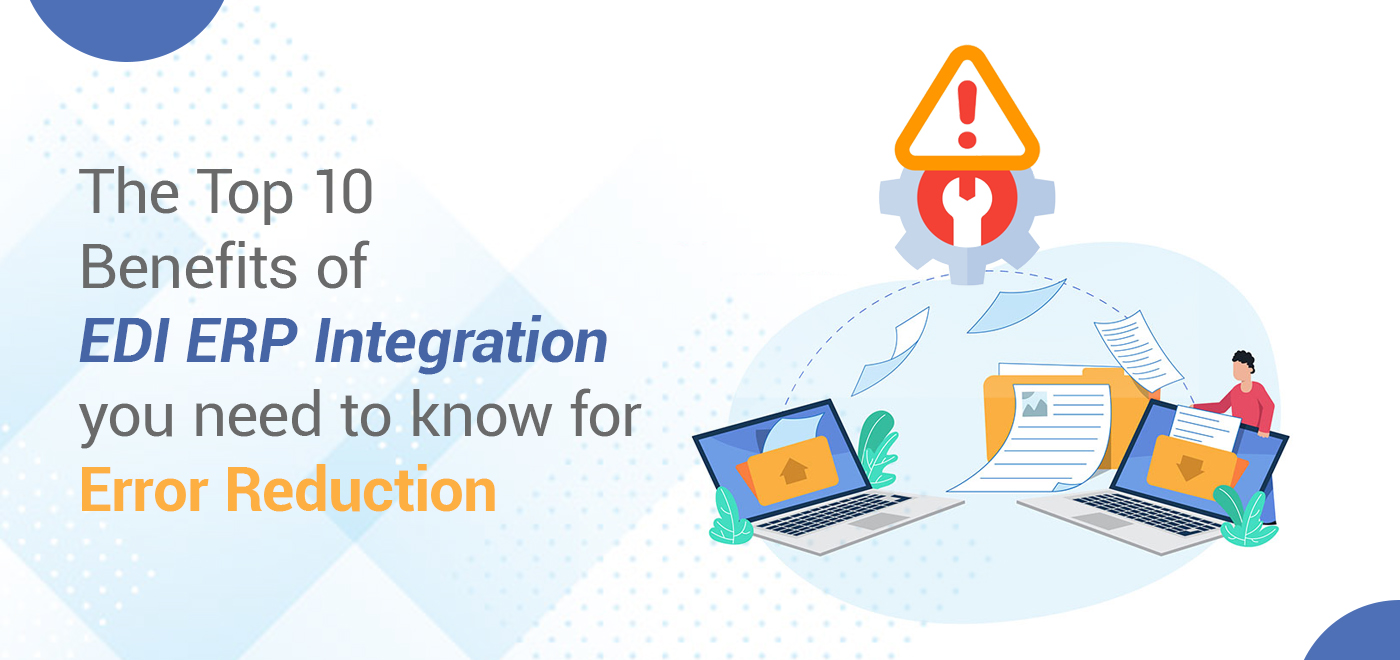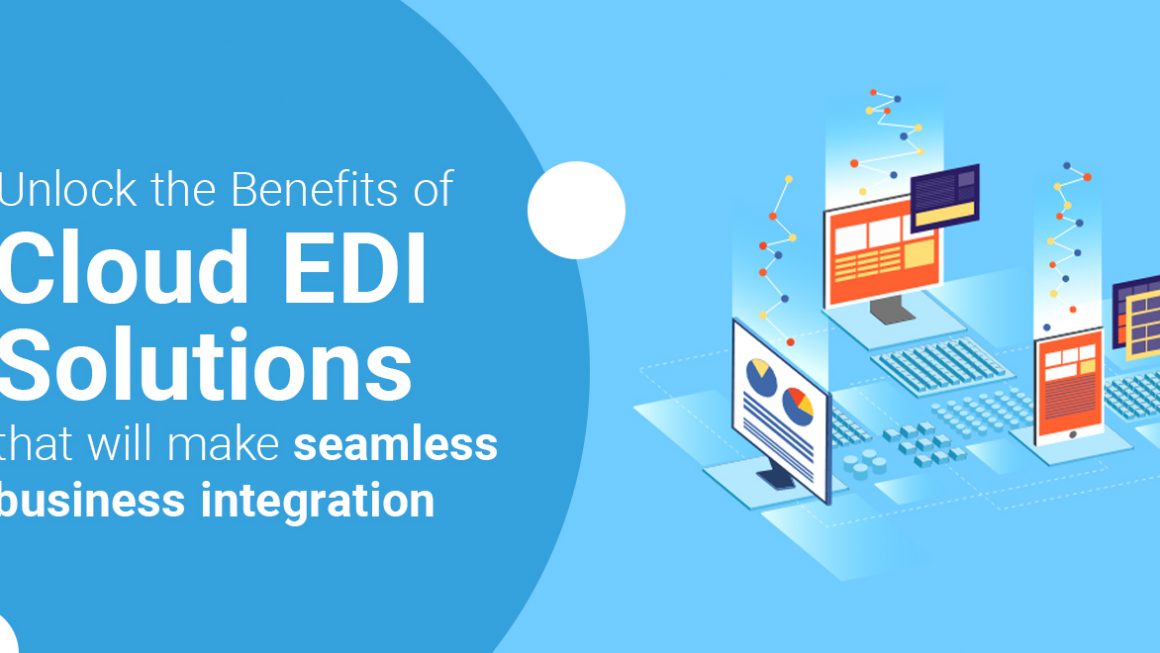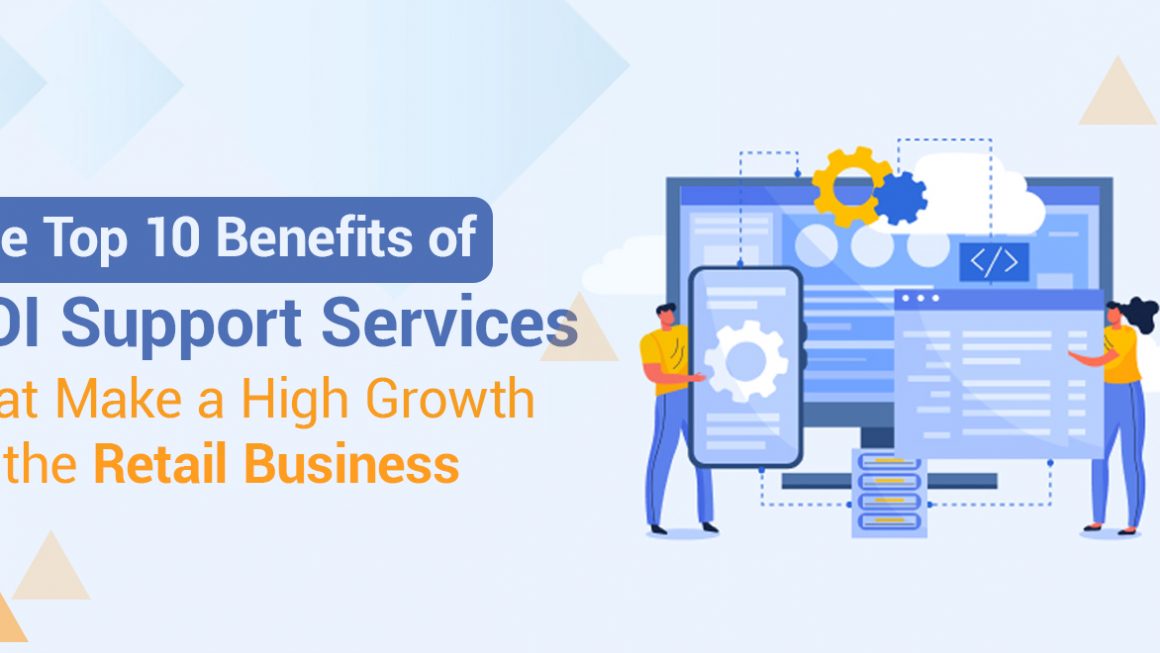Introduction
Business processes always change, so being efficient is key to long-term success. Putting Electronic Data Interchange (EDI) and Enterprise Resource Planning (ERP) tools together is a game-changing way for businesses to improve their processes. This blog post talks about how important it is to integrate EDI ERP systems and how that can greatly improve the accuracy of business processes. Electric Data Interchange (EDI) is when two businesses that do business with each other send and receive business papers like invoices and orders electronically in a standard format. On the other hand, Enterprise Resource Planning (ERP) is a group of connected programs controlling important real-time business tasks, like budgeting, human resources, and production.
EDI and ERP systems each have their benefits, but when they work together, they can do amazing things. When these systems work together, they make it easier for data to flow, improve communication, and keep the business world running smoothly. Errors can happen when data is being sent and processed. According to edi software companies, this connection is crucial for fixing that problem. Let’s take a close look at them.
Overview of EDI ERP Integration
Before you can understand how important it is for EDI and ERP to work together to cut down on mistakes. You need to know what each system does and how it improves total operational efficiency.
Electronic Data Interchange (EDI) lets different organizations share data. It is the digital backbone of business communication. It gets rid of the need to enter data by hand and lowers the chance of making mistakes that come with using paper forms. Meanwhile, Enterprise Resource Planning (ERP) systems are all-in-one tools that bring together different business processes into a single system. ERP makes sure that teams can share information in real-time, which makes work more organized and efficient.
Importance of Connecting These Systems for Improved Efficiency
Both EDI and ERP systems are very good at what they do, but they reach their full potential when they work together. When these systems are integrated, they create a smooth link between trade partners, suppliers, and internal departments. This makes the business and edi managed services ecosystem more responsive and linked. EDI Integration makes conversation easier, which speeds up decision-making, improves teamwork, and, most importantly, cuts down on mistakes.
Introduction to the Primary Focus: Error Reduction
At the heart of the ERP EDI integration lies a fundamental goal: the reduction of errors that can impede operational excellence. Errors in data transmission, order processing, and inventory management can lead to financial losses, customer dissatisfaction, and compliance issues. The subsequent sections of this blog will delve into the specific benefits of integration, shedding light on how it addresses and mitigates errors across diverse facets of business operations. From enhanced data accuracy to automated error notifications, each aspect plays a crucial role in fortifying the foundation of a resilient and error-free business environment.
Top 10 Benefits of EDI ERP Integration
1: Enhanced Data Accuracy
Manual data entry is susceptible to human errors, ranging from typos and miscalculations to oversight of critical information. These errors, when left unaddressed, can propagate through various business processes, compromising the integrity of data and decision-making. Inaccurate data not only hampers day-to-day operations but can also have far-reaching consequences on financial reporting, inventory management, and customer relations. To eliminate these errors is one of the major responsibilities of an EDI consultant.
One of the primary advantages of EDI ERP integration is its ability to automate data transfer between systems. By eliminating the need for manual intervention in data exchange, EDI integration software minimizes the risk of human errors. Automated processes ensure that data is accurately and consistently transferred, maintaining the integrity of information across the entire supply chain and organizational ecosystem.
2: Faster Processing Times
Processing data by hand takes a lot of time and can cause delays. People are needed at different steps of data handling, from placing an order to fulfilling it. This can cause bottlenecks that slow down the flow of information. Delays in processing times not only impact operational efficiency but also have a cascading effect on customer satisfaction and total business agility. Utilizing edi support services is the best option in such a scenario.
3: Improved Visibility and Tracking
Visibility into business processes is crucial for informed decision-making and proactive management. Traditional, non-integrated systems may lack the real-time visibility needed to track the movement. Especially of goods, monitor order statuses, and assess inventory levels promptly. This lack of visibility can result in uncertainties and challenges in responding to dynamic market conditions.
EDI ERP integration enhances visibility by providing real-time tracking capabilities across the entire supply chain. Integrated systems enable stakeholders to monitor the status of orders, shipments, and inventory levels in real-time. This newfound transparency empowers decision-makers with timely and accurate information, allowing them to make informed choices, optimize processes, and address potential issues before they escalate.
4: Seamless Order Processing
Manual order processing is inherently susceptible to errors and inefficiencies. From order entry to fulfillment, the reliance on manual data entry increases the risk of order discrepancies, delays, and miscommunication. These challenges not only impact customer satisfaction but can also strain relationships with suppliers and partners.
The integration of EDI and ERP systems and EDI managed services revolutionize order processing by automating key stages of the workflow. Automated order entry, validation, and fulfillment processes significantly reduce the likelihood of errors. Integration ensures that orders seamlessly flow through the system, from initial placement to final delivery, with minimal manual intervention. This streamlined approach not only accelerates order fulfillment but also enhances accuracy and reliability.
5: Automated Error Notifications and Alerts
Finding errors quickly is essential to keep problems from getting worse. Manual systems might not have the tools to find mistakes right away, which can cause data and processes to be off for a long time. The longer mistakes go undiscovered, the worse they could be for the business in many ways, such as making customers happy, keeping track of money, and following the rules.
When you integrate EDI and ERP, you get automated mistake-detection tools that quickly find problems in data and processes. Whether it’s a wrong invoice, a difference in the number of items in stock, or a failed data transfer, integrated systems can send out messages and alerts right away. These alerts let businesses know about mistakes right away, so they can fix them quickly and lessen the effect they have on other processes.
6: Compliance and Regulatory Adherence
Following the rules and laws of the industry is an important part of running a business. Compliance rules must be followed at all times. If they are not, the business could face fines, legal problems, and damage to their image. Due to their natural tendency to make mistakes, manual processes make it very hard to keep up with the required levels of compliance.
When EDI and ERP systems work together, they are more accurate and consistent, which is very important for compliance. Integration makes it easier to share data automatically and use standard procedures, which lowers the chance of mistakes in important areas like keeping records, reporting, and documenting. One benefit is that it makes compliance easier, and another is that it gives businesses faith that they are following the rules.
7: Cost Reduction
Errors in business processes can have significant financial implications. Whether it’s the cost of rectifying errors, dealing with customer dissatisfaction, or addressing compliance-related issues, the financial toll of errors can accumulate rapidly. Manual processes, being more prone to errors, contribute to increased operational costs, negatively impacting the bottom line.
EDI ERP integration is a strategic investment that pays dividends in terms of cost reduction. By minimizing errors in data entry, order processing, and compliance, integrated systems contribute to operational efficiency. The streamlined processes result in cost savings through reduced labor requirements, fewer instances of rework, and a decrease in the overall operational overhead associated with error resolution.
8: Enhanced Customer Satisfaction
Customer happiness is a key part of doing well in today’s business world. Order delivery that is done correctly and on time is a key factor that affects the customer experience. If there are mistakes in processing an order, like missing or late shipments, customers may not be happy, which can hurt the business’s image. Maintaining high levels of customer happiness is hard to do with manual processes prone to mistakes.
Integration of EDI and ERP is a key part of making customers happier by reducing mistakes in the order processing process. A smooth and error-free customer experience is made possible by automated order processing, accurate inventory management, and real-time insight into order statuses. Integration makes sure that customers get the right goods at the right time, which builds trust and loyalty.
9: Scalability and Growth
Businesses that work in settings that change quickly need to be able to expand their operations to keep up with rising demand. Businesses may not be able to easily adapt to changes in the market when they use old, non-integrated systems that aren’t scalable. Integration of EDI and ERP systems makes it possible to grow by streamlining processes, cutting down on mistakes, and improving total operational efficiency.
Integrated systems not only meet the needs of operations right now, but they also set up businesses for growth in the future. Integration makes processes more automatic and consistent, which creates a framework that can be expanded. Integrated systems make it easy for companies to handle more transactions, more trading partners, and changing business needs as they grow. This ability to change is a key part of supporting long-term growth.
10: Future-Proofing Your Business
Technology advances, changing customer habits, and industry trends are all things that are always changing the business world. If businesses don’t change with the times, they could get left behind. Putting in place strategies that keep a business strong and flexible in the face of changing challenges is what future-proofing means.
EDI ERP integration is becoming a key way for businesses to prepare for the future. Integration not only meets the operational needs of today. But it also sets companies up for future challenges by automating, standardizing, and making them more efficient. Because integrated systems are flexible by nature, they let businesses use new technologies, follow new rules, and easily change to changing industry standards.
Conclusion
In the end, businesses need to be accurate, efficient, and flexible. When you put Electronic Data Interchange (EDI) and Enterprise Resource Planning (ERP) tools together, things can change in a big way. As we’ve gone over the top 10 benefits of the EDI ERP link, one thing that keeps coming up is how much it helps companies make fewer mistakes. Each benefit makes the business setting better and less likely to make mistakes, whether it’s making data more accurate or making plans for the future. There are no issues when EDI and ERP systems are used together. This speeds up processes and keeps companies safe from mistakes, and delays. Safety issues that come with doing things by hand.
As companies want to be as productive as possible, they should connect their EDI and ERP platforms. This is both a present answer and a plan. The integration adds automation, visibility, and freedom to a business. These features not only cut down on mistakes but also prepare it for long-term growth and competition. Putting EDI and ERP systems together is not only a new technology but also a must for businesses that want to do well in a world that is always changing.
With the power of integration, businesses can deal with problems with confidence, make things better for customers, and lay the groundwork for long-term success. The business can always look for EDI service providers in USA for the best EDI software solutions. EDI and ERP will continue to be an important part of how businesses run in the future. Because they work together to make them more efficient, cut down on mistakes, and keep growing.
FAQs
Q1: What is EDI ERP integration, and why is it essential for businesses?
EDI ERP integration refers to the seamless connection between Electronic Data Interchange (EDI) and Enterprise Resource Planning (ERP) systems. It is essential for businesses as it streamlines operations, automates data exchange, and reduces errors in processes. Ultimately the goal is to enhance efficiency and decision-making.
Q2: How does EDI ERP integration improve data accuracy?
EDI ERP integration improves data accuracy by automating data transfer between systems. The elimination of manual data entry reduces the risk of human errors.
Q3: Can EDI ERP integration help businesses save costs?
Yes, EDI ERP integration can contribute to cost savings. By minimizing errors in data entry, order processing, and compliance, integrated systems enhance operational efficiency, reducing labor requirements and instances of rework.
Q4: How does EDI ERP integration support business scalability?
EDI ERP integration supports business scalability by providing a foundation for efficient and standardized processes.



